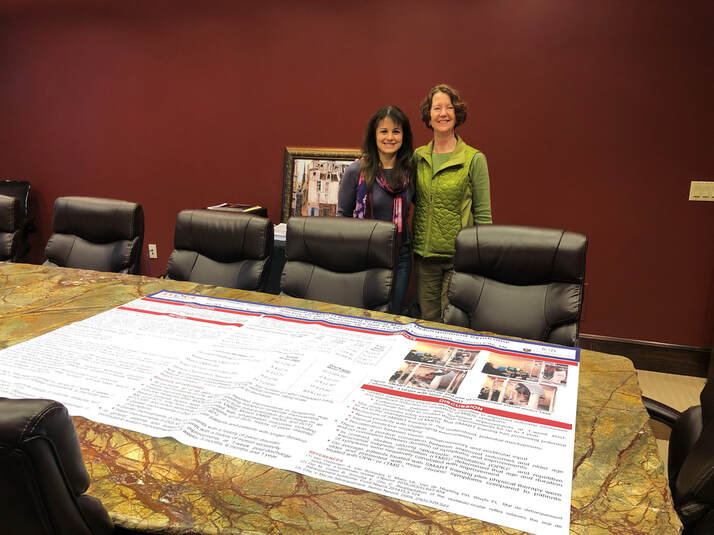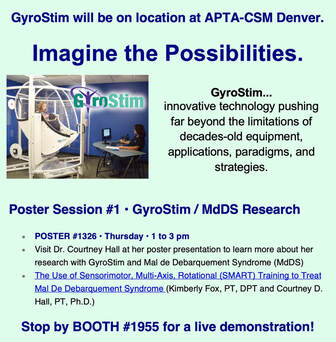 Dr. Kim Fox, DPT and Dr. Courtney Hall, PT, PhD behind their research presentation poster.  Dr. Courtney Hall, PT, PhD presented their research findings at the APTA CMS on February 13, 2020 in Denver, Colorado. Presentation 1326 Abstract The use of sensorimotor, multi-axis, rotational (SMART) training to treat Mal de Debarquement Syndrome Purpose/Hypothesis: Mal de Debarquement Syndrome (MdDS) is a rare condition in which those afflicted perceive a chronic rocking or swaying sensation, often relieved when in motion and symptomatic when still. Etiology is uncertain; therefore, treatment options are limited. While there is reported success with medication, optokinetic stimulation or transcutaneous magnetic stimulation, there is no single treatment that works for all patients. This retrospective chart review investigated rehabilitation outcomes following sensorimotor, multi-axis, rotational (SMART) training to address MdDS symptoms. Number of Subjects: Forty-nine Materials and Methods: Forty-nine patients participated in 10-20 sessions of SMART training, with integrated use of a visual targeting system and physical therapy. Between sessions, patients were instructed to perform mindfulness breathing, relaxation and grounding techniques. Pre- and post-training Dizziness Handicap Inventory (DHI), 4-item Dynamic Gait Index (DGI), and computerized posturography including Sensory Organization Test (SOT) were assessed. Subjective change following rehabilitation was tracked at discharge, 5 weeks, 3 months, 6 months and 1 year post-training. Results: Mean age (SD) of patients was 52.9 (12.6) years with the majority (n=47) being female. Mean time from onset of symptoms (SD) was 50.8 (87.8) months suggesting chronic symptoms. At discharge, 42 of 49 patients reported improvements, with nearly half (n=24, 48.9%) of all patients reporting marked or moderate improvement in symptoms; whereas, 14 (28.6%) reported minimal improvement in symptoms. Based on paired t-tests, all outcome measures – DHI, MdDS severity Visual Analog Scale (VAS), Motion VAS, 4-item DGI, and SOT - improved significantly (p < 0.001) from initial evaluation to discharge. Several personal factors were associated with rehabilitation outcomes based on bivariate correlations. With some variation, patients sustaining improvements at 1 week post-discharge, generally continued to sustain at 5 weeks, 3 months, 6 months and 1 year. Conclusions: SMART training plus physical therapy resulted in improved performance outcomes and in significant reduction or resolution in MdDS symptoms. This study provides early evidence that this method of training has promising potential to aid in the management or recovery of MdDS. Clinical Relevance: MdDS is disorder with no specific cure. Treatment is limited. SMART training may serve as an effective outcome to reduce or resolve symptoms associated with MdDS. See Research Gate Kim Fox and Courtney Hall publication of research for more details https://www.researchgate.net/publication/333669306_The_use_of_sensorimotor_multi-axis_rotational_SMART_training_to_treat_Mal_de_Debarquement_Syndrome_MdDS |
AuthorDr. Kim Fox, DPT is a graduate of the University of Maryland School of Medicine at Baltimore and the University of Montana School of Physical Therapy. Archives
April 2023
Categories |
AVORA, LLC is a privately owned and operated healthcare company where the patient comes first. Copyright 2010-2024.



 RSS Feed
RSS Feed